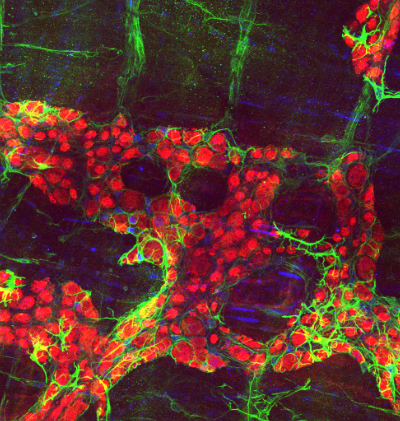
PHILADELPHIA - For the first time, cells involved with the communication between stress responses in the brain and inflammation in the gastrointestinal (GI) tract have been identified in animal models, according to findings from the Perelman School of Medicine at the University of Pennsylvania, published recently in Cell. Glial cells, which support neurons, communicate stress signals from the central nervous system (CNS) to the semi-autonomous nervous system within the gastrointestinal (GI) tract, called the enteric nervous system (ENS). These psychological stress signals can cause inflammation and exacerbate symptoms of inflammatory bowel disease (IBD).
An estimated 1.6 million Americans currently have IBD, which refers to two conditions - Crohn's disease and ulcerative colitis - characterized by inflammation of the GI tract, and can cause symptoms like persistent diarrhea, abdominal pain, and bloody stools. Prolonged inflammation can also lead to permanent damage to the GI tract. Current treatments consist of anti-inflammatory drugs, immune suppressants, dietary changes, and steroids.
"Clinicians have long observed that chronic stress can worsen IBD symptoms, but until now, no biological connection has been identified to explain how the digestive system knows when someone is stressed," said senior author Christoph Thaiss, PhD, an assistant professor of Microbiology.
In the study, researchers found that, like humans, mice with IBD developed severe symptoms when stressed. They traced the initial stress response signals to the adrenal cortex, which releases glucocorticoids-steroid hormones that activate the physiological responses to stress throughout the body. The researchers found that neurons and glia in the ENS responded to chronically elevated glucocorticoid levels, suggesting that they are the link between stress perception by the brain and intestinal inflammation.
While glucocorticoids typically have an anti-inflammatory effect in the body, the researchers found that when glia in the ENS were exposed to the steroid hormones for a prolonged period, such as during chronic stress, they attract white blood cells to the GI tract that increase inflammation. The researchers also found that when exposed to chronic stress, the neurons in the ENS in the GI tract stop functioning as they normally do, which can lead to impaired bowel movements and exacerbated IBD symptoms.
Thaiss and collaborators verified the connection between psychological stress and IBD symptoms in humans using the UK Biobank and a patient cohort from the IBD Immunology Initiative at Penn Medicine. They found that the in patients with an IBD diagnosis, the level of reported stress correlated with an increased severity of IBD symptoms.
"This finding highlights the importance of psychological evaluations in patients being treated for IBD, as well as to inform treatment protocols," said Maayan Levy, PhD, an assistant professor of Microbiology and co-senior author of the study. "One of the most common treatments for IBD flare-ups is steroids, and our research indicates that in patients with IBD who experience chronic stress, the efficiency of this treatment could be impaired."
Researchers underscore the opportunity for more research into the biology of enteric glial cells, and the role they play in many regulatory systems within the body, including the communication between the nervous system and the immune system.
This study was supported by the National Institutes of Health (F31HL160065, 5T32AI141393-03, AI155577, AI115712, AI117950, AI108545, AI082630, CA210944, 1R01DK122798-01A1, 1R01DK129691-01, 1R01DK128282, 1R21NS116574-01A1, DP2-AG-067511, DP2AG067492, 1R01DK129691-01), the Pew Biomedical Scholars program, the Human Frontiers Science Program, the Edward Mallinckrodt, Jr. Foundation, the Penn Center for Molecular Studies in Digestive and Liver Diseases (P30-DK-050306), and the Kenneth Rainin Foundation.






